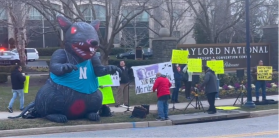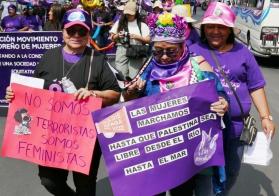Reopening of Jesuit Case, Concerns Over Exclusion of Victims Political Manipulation
In late February, 2022, El Salvador made international headlines once again as news circulated that prosecutors had filed charges against former Salvadoran President Alfredo Cristiani, alongside several other high-ranking military officials, for suspected involvement in the 1989 Jesuit massacre at the Universidad Centroamericana José Simeón Cañas (UCA). On the surface, this news is welcome: For more than 32 years, the case has been marked by impunity and its intellectual authors protected--first by the 1993 Amnesty Law and, after that law was repealed in 2016, by various defense team tactics. However, although the Bukele administration has lauded the move to reopen the case as a long-overdue step toward justice, the political context and manner in which the process is being carried out has drawn concern and criticism from various sectors of civil society, including from the UCA itself. (*For a more detailed timeline of recent developments, see the addendum at the end of this article.)
In a March 14 statement, the UCA warned that the reopening of the case is occurring within the framework of a “dismantling of the rule of law and constant harassment towards the university.” Under the increasingly authoritarian Bukele administration, El Salvador is experiencing alarming levels of institutional instability, political persecution, consolidation of power, lack of transparency across government agencies, a growing military presence in everyday life, and, most recently, mass raids on poor, rural communities in response to a surge in homicides. Political opponents denouncing these abuses have been subject to imprisonment without due process or other Constitutional guarantees, raids, and/or accusatory interrogations–all without substantiation. The UCA is among those who have spoken out, and, as a result, has likewise faced a “sustained campaign of harassment” and disparagement. This aggressive and confrontational environment, the UCA cautions, lacks the “objectivity and judicial independence to guarantee truth, do justice, repair damage, or foster reconciliation.”
Additionally, the university says that it has effectively been shut out of the proceedings. Even though the university community has lived with the massacre for more than 30 years and has established a renowned Human Rights Institute (IDHUCA) to investigate war crimes and other serious abuses including the massacre on its campus, its lawyers were removed as plaintiffs at the defense’s request with no objection from the prosecution.
Further, victims’ families and other advocate organizations have also been excluded from the process. The UCA denounces the fact that the current investigative team has not consulted with victims’ families or victims’ organizations to ensure that their interests and wishes are represented. In fact, court filings show that the attorney general’s office did not have the contact information for the victims’ families or other directly affected individuals. IDHUCA representative Arnau Baulenas, one of the removed attorneys, said in response that, "The judicial system of our country is scared of truth and justice and, therefore, what they do is eliminate the representation of victims in the judicial process."
The reopening of the UCA case is not the first time a high-profile wartime crime has been used by the Bukele administration to curry favor with the Salvadoran population. Bukele kicked off his presidency with a media spectacle centered around removing the name of Domingo Monterrosa (then Atlacatl Battalion Commander named in the UN Truth Commission as responsible for the El Mozote massacre) from an army barracks, promising justice for El Mozote. In reality, however, his administration has refused to release military archive files that would aid the prosecution, removed the judge overseeing the trial, and now is allegedly planning reconstruction in El Mozote that violates the wishes of the community.
As is the case in so many wartime crimes and atrocities committed by the US-funded, -trained, and -advised Salvadoran military, the victims of the UCA massacre deserve truth and justice, and their families and communities, repair. In the words of the UCA: it is imperative that “the case not be manipulated for political or private ends, and that the wishes and suffering of the victims not be played with.”
*Addendum: Timeline of recent developments in the case: In late 2021, current Attorney General Rodolfo Delgado filed an amparo, or special appeal to overturn a 2020 resolution that had closed the Jesuit case. In January 2022, the Constitutional Chamber of El Salvador’s Supreme Court responded favorably to that appeal and ordered that the case be reopened. In February 2022, high-ranking military and other officials, including former Salvadoran President Alfredo Cristiani and legislator Rodolfo Parker, who at the time of the massacre was legal advisor to the Armed Forces, were subpoenaed to appear in court for initial proceedings. Both Cristiani and Parker were out of the country at the time of the subpoenas and did not appear. In early March 2022, arrest warrants were issued for their capture.

 "I am a CISPES supporter because continuing to fight for social justice and a more people-centered country means continuing the dream and sacrifice of thousands of my fellow Salvadorans who died for that vision.” - Padre Carlos, New York City
"I am a CISPES supporter because continuing to fight for social justice and a more people-centered country means continuing the dream and sacrifice of thousands of my fellow Salvadorans who died for that vision.” - Padre Carlos, New York City

